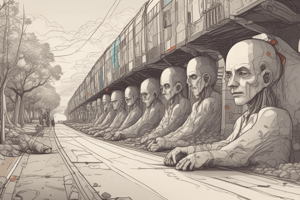Podcast
Questions and Answers
According to Ceci & Liker (1986), what can be an example of complex reasoning?
According to Ceci & Liker (1986), what can be an example of complex reasoning?
- A student's understanding of mathematical equations
- A child's learning to read
- A gambler's thinking about horses' probability of winning (correct)
- An adult's decision to start a new business
What is an example of an individual quality that can influence social interactions?
What is an example of an individual quality that can influence social interactions?
- A child's academic achievement
- A child's language skills
- A child's shyness and inhibition (correct)
- A child's physical appearance
What is an example of a stagelike, qualitative change in cognitive development?
What is an example of a stagelike, qualitative change in cognitive development?
- Development of fine motor skills
- Increased interest in reading
- Shift from preoperational to concrete operational thought (correct)
- Improvement in memory skills
What is a key concept in Bronfenbrenner's bioecological theory?
What is a key concept in Bronfenbrenner's bioecological theory?
What can be an outcome of changes in cognitive development?
What can be an outcome of changes in cognitive development?
What is an example of a proximal process in development?
What is an example of a proximal process in development?
What can influence a child's cognitive development?
What can influence a child's cognitive development?
What can be a result of bidirectional causality in development?
What can be a result of bidirectional causality in development?
What is the primary factor influencing intelligence, according to some researchers?
What is the primary factor influencing intelligence, according to some researchers?
Which of the following is a common view on personality development?
Which of the following is a common view on personality development?
What is the significance of early life events on psychological development?
What is the significance of early life events on psychological development?
How much do people's personalities change over their lifetimes?
How much do people's personalities change over their lifetimes?
Do people go through the same stages of life?
Do people go through the same stages of life?
What is the relationship between genes and personality development?
What is the relationship between genes and personality development?
What is the primary influence on social development?
What is the primary influence on social development?
What is a potential implication of holding the belief that a person's intellectual capacity can change and improve over time?
What is a potential implication of holding the belief that a person's intellectual capacity can change and improve over time?
What is a key aspect of individual differences?
What is a key aspect of individual differences?
What can impair critical thinking in reflective practice?
What can impair critical thinking in reflective practice?
What is a way to counteract the misapplication of personal views?
What is a way to counteract the misapplication of personal views?
Why might helping professionals be reluctant to give up their personal theories?
Why might helping professionals be reluctant to give up their personal theories?
What is the purpose of examining one's beliefs about development?
What is the purpose of examining one's beliefs about development?
What is a potential outcome of believing that intelligence is fixed and not amenable to improvement?
What is a potential outcome of believing that intelligence is fixed and not amenable to improvement?
What is the concept that suggests physical characteristics are primarily inherited through genes?
What is the concept that suggests physical characteristics are primarily inherited through genes?
What is the term for the process of being aware of one's personal theories and recognizing they are only one of many possibilities?
What is the term for the process of being aware of one's personal theories and recognizing they are only one of many possibilities?
A child who is shy and inhibited will often receive more support from others when they need it.
A child who is shy and inhibited will often receive more support from others when they need it.
Changes in cognitive development are always continuous and graded.
Changes in cognitive development are always continuous and graded.
Bidirectional causality only occurs between the child and their microsystems.
Bidirectional causality only occurs between the child and their microsystems.
A person's intellectual capacity cannot change and improve over time.
A person's intellectual capacity cannot change and improve over time.
Individual differences in cognitive development are solely determined by genetic factors.
Individual differences in cognitive development are solely determined by genetic factors.
Proximal processes only occur in cognitive development.
Proximal processes only occur in cognitive development.
A person's personality is fixed and unchangeable.
A person's personality is fixed and unchangeable.
Critical thinking is only impaired by genetics.
Critical thinking is only impaired by genetics.
Increase in testosterone levels can be a result of social change.
Increase in testosterone levels can be a result of social change.
Multidimensional theories of development portray the developing person as a fixed entity.
Multidimensional theories of development portray the developing person as a fixed entity.
Bidirectional causality implies that only external factors influence development.
Bidirectional causality implies that only external factors influence development.
Individual differences can influence social interactions.
Individual differences can influence social interactions.
Cognitive development only involves incremental and continuous changes.
Cognitive development only involves incremental and continuous changes.
The environment plays no role in shaping an individual's development.
The environment plays no role in shaping an individual's development.
Developmental changes are always permanent and irreversible.
Developmental changes are always permanent and irreversible.
Individuals play no active role in their own development.
Individuals play no active role in their own development.
Vines grow in a fixed direction without being influenced by their environment.
Vines grow in a fixed direction without being influenced by their environment.
Multidimensional theories of development have similar fundamental assumptions and characteristics.
Multidimensional theories of development have similar fundamental assumptions and characteristics.
The growth of the vine does not affect the growth of the trees and other plants in the forest.
The growth of the vine does not affect the growth of the trees and other plants in the forest.
Bioecological theory is not a multidimensional theory of development.
Bioecological theory is not a multidimensional theory of development.
Proximal processes have a more significant impact on development than distal processes.
Proximal processes have a more significant impact on development than distal processes.
Bidirectional causality is a one-way process where the environment influences the individual.
Bidirectional causality is a one-way process where the environment influences the individual.
Individual differences do not play a role in development.
Individual differences do not play a role in development.
Cognitive development is separate from emotional development.
Cognitive development is separate from emotional development.
Flashcards are hidden until you start studying
Study Notes
Individual Qualities and Reasoning
- A person's reasoning abilities can vary across different contexts, such as a gambler's complex reasoning about horse racing, but not displaying similar complex reasoning in other areas.
- Demand characteristics, or behavioral tendencies, can influence how others react to an individual, such as a shy child receiving less attention and support.
Change and Development
- Changes in an individual can be emergent, stagelike, and qualitative (e.g., shift from preoperational to concrete operational thought) or continuous and graded (e.g., shifts in academic interest).
- Both types of change result from proximal processes, influenced by internal and external causes.
- Once changes occur, the individual brings new resources to these proximal processes, leading to further learning and development.
Bioecological Theory of Development
- Urie Bronfenbrenner's theory emphasizes the interplay between internal and external influences on the developing child over time.
- The theory highlights the bidirectional causality between adjacent levels and within the same level.
Implicit Theories and Critical Thinking
- Implicit theories or personal beliefs about development can shape one's worldview and influence behavior.
- Holding a fixed or growth mindset about intelligence can impact one's approach to problem-solving and helping others.
- Critical thinking and reflective practice require self-monitoring and awareness of one's implicit theories and their limitations.
- Recognizing that personal theories are only one of many possibilities is essential for effective practice.
Individual Qualities
- A person's reasoning abilities can be complex in one context, but not in others (e.g., a gambler analyzing horse racing probabilities)
- Demand characteristics, such as shyness or outgoingness, can influence how others react to an individual
- Shyness can have biological roots and affect how much attention and support a person receives
Types of Change
- Changes can be emergent (qualitative, stagelike) or continuous (graded, incremental)
- Examples of emergent changes include shifts from preoperational to concrete operational thought
- Proximal processes (interactions between the individual and their environment) influence change
Bidirectionality
- Changes in an individual can lead to new experiences and learning opportunities
- The individual's new resources (e.g., concrete operational thought) influence proximal processes
- Bidirectional causality exists between different levels and parts of the system (e.g., biology, environment)
Multidimensional Models
- These models acknowledge and integrate various types of change (qualitative, incremental, reversible)
- Examples of multidimensional models include transactional theory, relational theory, dialectical theory, bioecological theory, and more
- These models share fundamental assumptions and characteristics, but provide different levels of detail on various aspects of development
Bronfenbrenner's Bioecological Theory
- This theory proposes a multidimensional model of development, with internal and external influences
- Figure 1.2 illustrates the bidirectional relationships between the individual, microsystems, and external influences
Studying That Suits You
Use AI to generate personalized quizzes and flashcards to suit your learning preferences.




